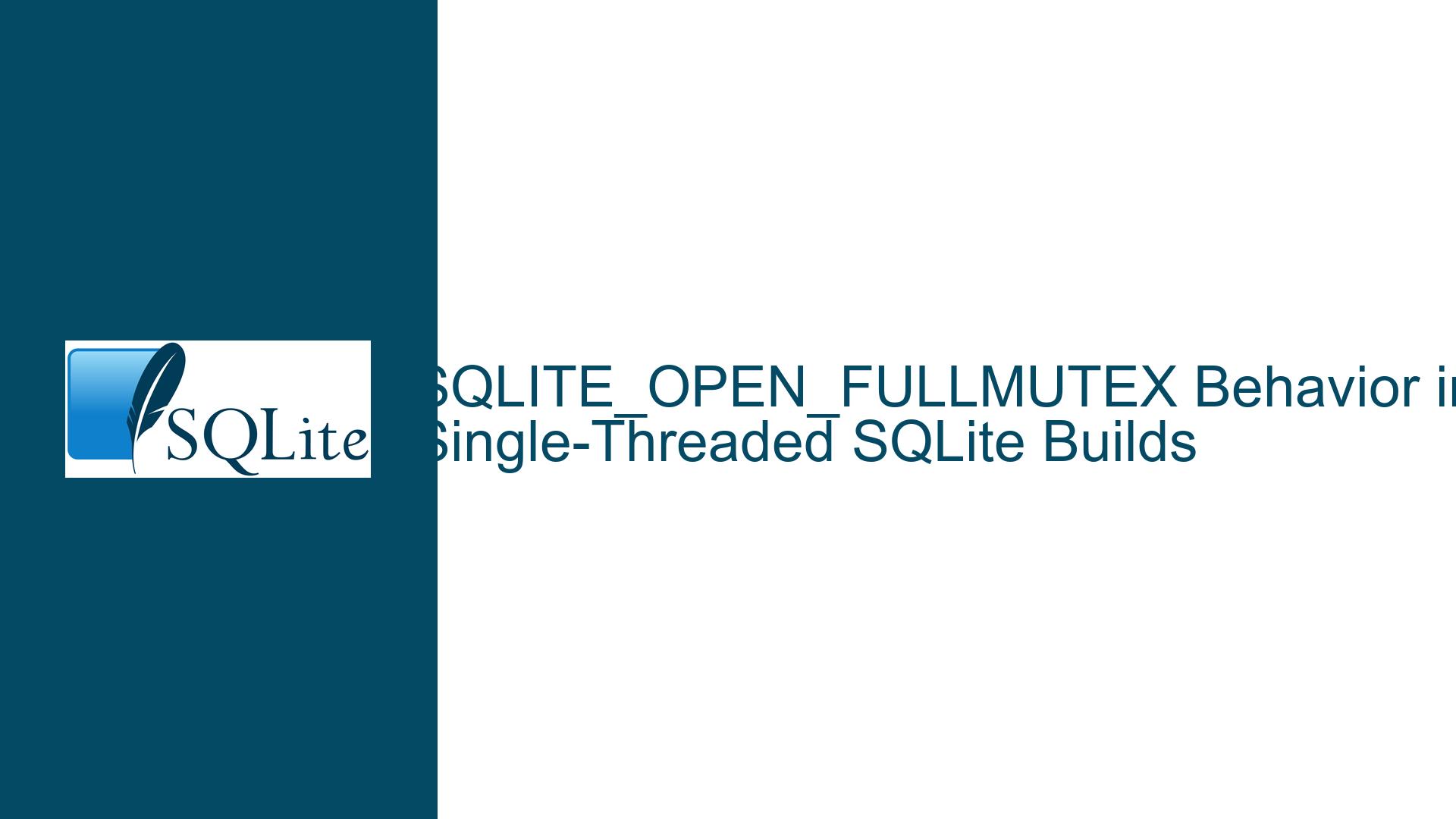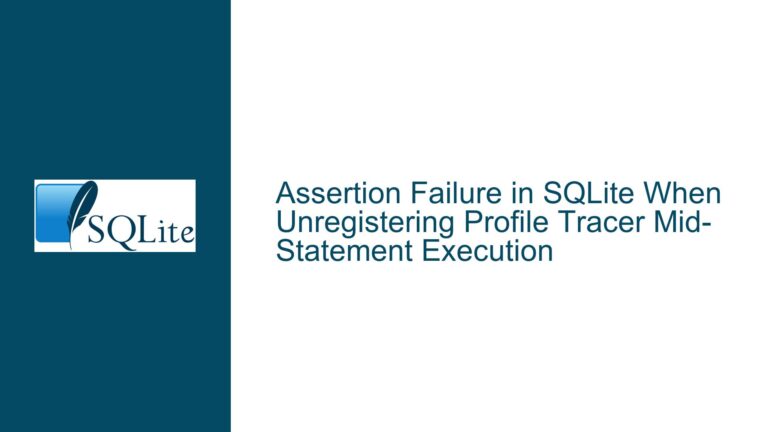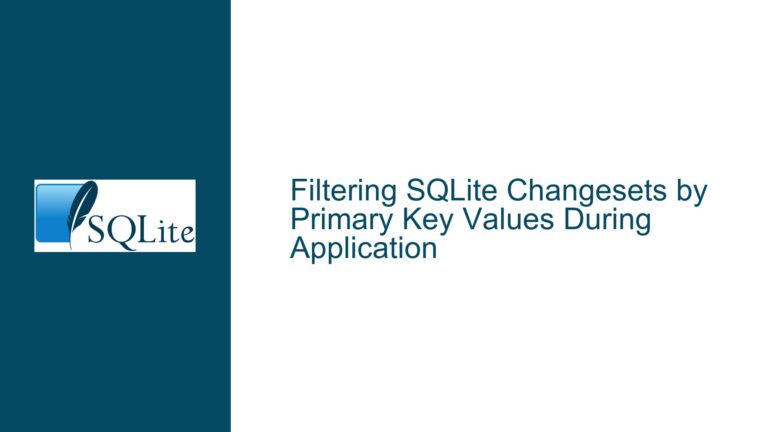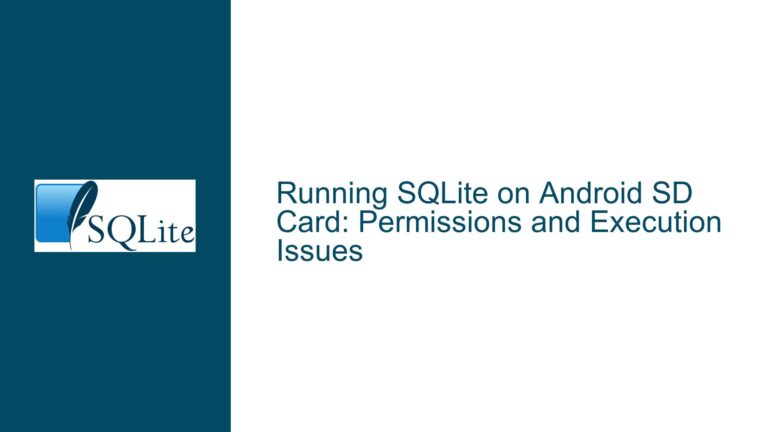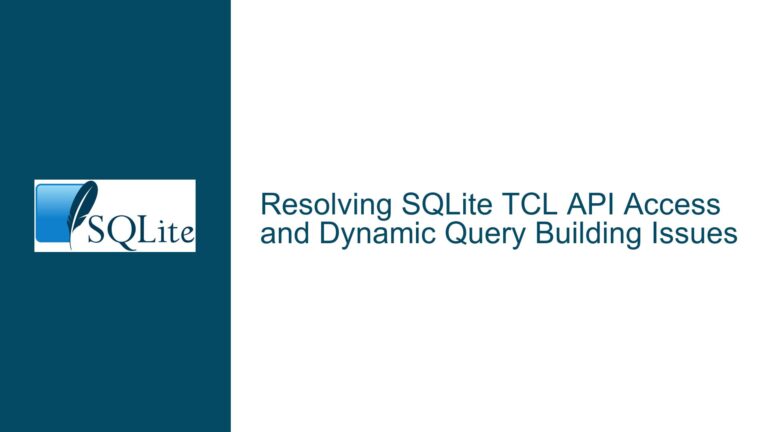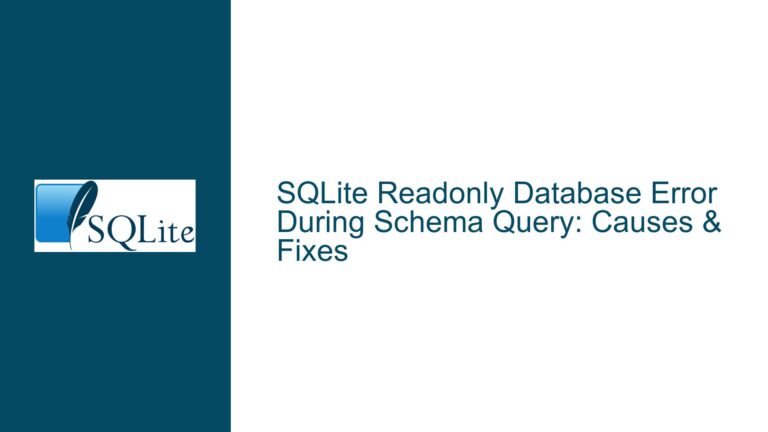SQLITE_OPEN_FULLMUTEX Behavior in Single-Threaded SQLite Builds
Interaction Between Compile-Time Thread Safety and Runtime Mutex Flags
The core issue revolves around the interplay between SQLite’s compile-time thread safety configuration (via -DSQLITE_THREADSAFE=0) and runtime mutex mode selection using SQLITE_OPEN_FULLMUTEX with sqlite3_open_v2(). When SQLite is compiled in single-threaded mode, the library disables all internal mutexing mechanisms. Attempting to override this behavior at runtime by specifying mutex-related flags creates ambiguity about error reporting, documentation gaps, and safe error-handling practices.
This problem arises in scenarios where developers:
- Compile SQLite with
-DSQLITE_THREADSAFE=0(single-threaded mode). - Attempt to open a database connection using
sqlite3_open_v2()withSQLITE_OPEN_FULLMUTEX(requesting serialized threading mode). - Expect deterministic error handling when runtime mutex flags conflict with compile-time thread safety settings.
The confusion stems from incomplete documentation about whether SQLITE_OPEN_FULLMUTEX triggers an error in single-threaded builds and whether developers can rely on error codes instead of proactively checking sqlite3_threadsafe().
Root Causes of Mutex Flag Conflicts in Single-Threaded Builds
1. Compile-Time Thread Safety Configuration Lock-In
SQLite’s threading model is determined at compile time via -DSQLITE_THREADSAFE=0|1|2. When -DSQLITE_THREADSAFE=0 is set:
- The library’s internal mutex logic is entirely disabled.
- The
sqlite3_threadsafe()API will unconditionally return0. - Runtime configuration changes via
sqlite3_config(SQLITE_CONFIG_MULTITHREAD)or similar are explicitly prohibited.
This design ensures that threading behavior is immutable after compilation. However, the documentation does not explicitly state how the runtime handles contradictory flags like SQLITE_OPEN_FULLMUTEX in such builds.
2. Ambiguity in Runtime Flag Enforcement
The sqlite3_open_v2() function accepts flags like SQLITE_OPEN_FULLMUTEX to request a specific threading mode for the database connection. In a single-threaded build:
- The
SQLITE_OPEN_FULLMUTEXflag implies a desire for serialized threading (requiring mutexes). - Since mutexes are disabled at compile time, this request is invalid.
The API’s behavior in this scenario is not fully documented, leading to uncertainty about whether it returns SQLITE_ERROR, ignores the flag, or exhibits undefined behavior.
3. Documentation Gaps on Error Reporting
SQLite’s API documentation prioritizes brevity and avoids exhaustive lists of error conditions. While sqlite3_open_v2()’s documentation specifies that invalid flags may cause errors, it does not explicitly mention conflicts between flags and compile-time settings. This omission creates confusion about whether developers must check sqlite3_threadsafe() before using mutex-related flags.
Resolving Mutex Flag Conflicts and Ensuring Safe Error Handling
Step 1: Validate Compile-Time Thread Safety Settings
Before writing code that depends on threading modes, determine the SQLite library’s thread safety configuration:
- Use
sqlite3_threadsafe()to check the runtime thread safety mode:int threadsafe = sqlite3_threadsafe(); if (threadsafe == 0) { // Single-threaded build; mutex flags are irrelevant. } - If the build is single-threaded (
threadsafe == 0), avoid passingSQLITE_OPEN_FULLMUTEXtosqlite3_open_v2().
Rationale:
Proactively checking sqlite3_threadsafe() prevents invalid flag usage and eliminates reliance on error handling for preventable issues.
Step 2: Handle SQLITE_OPEN_FULLMUTEX in Single-Threaded Builds
If SQLITE_OPEN_FULLMUTEX is used in a single-threaded build:
Expect an Immediate Error:
Thesqlite3_open_v2()function will returnSQLITE_ERRORif the flags conflict with the compile-time configuration.int rc = sqlite3_open_v2("database.db", &db, SQLITE_OPEN_READWRITE | SQLITE_OPEN_CREATE | SQLITE_OPEN_FULLMUTEX, NULL); if (rc == SQLITE_ERROR) { // Handle invalid flag usage. }Avoid Silent Failures:
In single-threaded builds, SQLite cannot honorSQLITE_OPEN_FULLMUTEX. The error code ensures developers are alerted to the conflict.
Testing Procedure:
- Compile SQLite with
-DSQLITE_THREADSAFE=0. - Attempt to open a connection with
SQLITE_OPEN_FULLMUTEX. - Verify that the return code is
SQLITE_ERROR.
Step 3: Implement Defensive Error Handling
While relying on SQLITE_ERROR is safe, combine it with proactive checks for robustness:
int threadsafe = sqlite3_threadsafe();
if (threadsafe == 0) {
// Avoid using SQLITE_OPEN_FULLMUTEX entirely.
} else {
int rc = sqlite3_open_v2(/* ... | SQLITE_OPEN_FULLMUTEX */);
if (rc != SQLITE_OK) {
// Handle errors (e.g., invalid flags, file not found).
}
}
Key Considerations:
- Error Codes vs. Proactive Checks:
While SQLite reliably returnsSQLITE_ERRORfor invalid flag usage, proactive checks reduce the likelihood of runtime errors and improve code clarity. - Portability Across Builds:
Code that checkssqlite3_threadsafe()adapts to different SQLite configurations (e.g., embedded vs. system libraries).
Step 4: Address Documentation Gaps
The current documentation omits explicit warnings about SQLITE_OPEN_FULLMUTEX in single-threaded builds. To mitigate future confusion:
- Update the
sqlite3_open_v2()Documentation:
Add a note stating thatSQLITE_OPEN_FULLMUTEXwill returnSQLITE_ERRORif the library is compiled with-DSQLITE_THREADSAFE=0. - Clarify Thread Safety Guarantees:
In the Thread Safety documentation, emphasize that runtime mutex flags cannot override compile-time settings.
Example Documentation Addition:
Note on Thread Safety Flags:
PassingSQLITE_OPEN_FULLMUTEXtosqlite3_open_v2()in a single-threaded build (compiled with-DSQLITE_THREADSAFE=0) will result in anSQLITE_ERRORreturn code. Developers should checksqlite3_threadsafe()before using mutex-related flags.
Step 5: Test Across Compile-Time Configurations
To ensure compatibility, test code under all three threading modes:
- Single-Threaded (
-DSQLITE_THREADSAFE=0):- Verify that
SQLITE_OPEN_FULLMUTEXtriggersSQLITE_ERROR. - Confirm that
sqlite3_threadsafe()returns0.
- Verify that
- Multi-Threaded (
-DSQLITE_THREADSAFE=2):- Ensure
SQLITE_OPEN_FULLMUTEXis ignored (serialized mode is not available).
- Ensure
- Serialized (
-DSQLITE_THREADSAFE=1):- Validate that
SQLITE_OPEN_FULLMUTEXenables serialized mode.
- Validate that
Automated Testing Script:
# Compile SQLite in single-threaded mode.
gcc -DSQLITE_THREADSAFE=0 -c sqlite3.c
gcc test.c sqlite3.o -lpthread -o test
./test # Expect SQLITE_ERROR for FULLMUTEX
# Repeat for -DSQLITE_THREADSAFE=1 and -DSQLITE_THREADSAFE=2
Final Recommendations
- Prefer Proactive Checks:
Usesqlite3_threadsafe()to avoid passing invalid flags. - Trust Error Codes:
IfSQLITE_OPEN_FULLMUTEXis used in a single-threaded build, SQLite will returnSQLITE_ERRORreliably. - Document Assumptions:
In codebases using SQLite, document whether single-threaded or multi-threaded builds are expected.
By following these steps, developers can safely navigate SQLite’s threading model and avoid subtle bugs caused by compile-time/runtime mismatches.
This guide provides a comprehensive framework for diagnosing and resolving issues related to mutex flags in single-threaded SQLite builds. It emphasizes proactive validation, defensive programming, and testing across configurations to ensure robust behavior.
